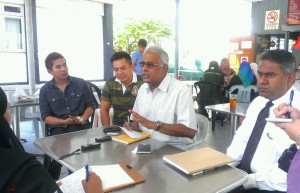By Charles Santiago
According to Wikipedia, it is any law, policy, practice, or proposal designed to define, restrict, or limit the possession, production or modification, importation, shipment, sale, and/or use of firearms.
There are a minimum of 370,000 guns owned in Malaysia, which has a total population of 28 million. Japan has a population of 127 million and 710,000 guns. Malaysia has a ratio of one gun to every 78 people, higher than Vietnam which has a ratio of 80:1.
But Malaysia has strict gun ownership laws. Only those with a license are allowed to own arms. Those caught possessing firearms without a license can face up to 14 years in prison. And having a live bullet can warrant the death penalty.
So where do the guns, used in the recent shooting spree, come from?
In 2011, Time magazine reported a dizzyingly-complex arms smuggling route in the region. The reporter said guns were readily available along the Cambodia-Thailand border as leftovers from the Pol Pot rule. She also said Malaysians were smuggling firearms (including rounds of ammunition) into the country, which were bought in Thai military camps.
It’s therefore clear that stringent laws, without enforcement, are inadequate to stem the shooting episodes that have gripped Malaysia. In other words regulating gun licenses is not enough. The government must also seriously look into preventing cross border smuggling. And these laws must be complemented with the government’s will to tackle the culture of corruption and impunity in the police force, Immigration and Customs.
The Malaysian police recently busted a gun-for-rent syndicate, validating claims that bullets cost 80 cents in the black market and guns could be rented at a low cost. More than 20 people have been killed in a spate of shooting since April this year. But the execution-style shooting of a retired Iranian banker shook the nation.
The hit happened barely days after an anti-crime campaigner, R Sri Sanjeevan, was shot. Days before, he had tweeted stating he will reveal links between top cops in the country and the underworld. People have been shot at busy road intersections, traffic lights and restaurants, with gunmen firing up to two dozen shots at a go, in broad daylight.
Following these hits, a website has ranked Kuala Lumpur as the sixth-most dangerous city in Southeast Asia. Police statistics released by the country’s economic reforms agency, Pemandu, show that there were 15,098 violent crime cases in the first six months this year, up from 14,811 in the same period last year. Murders rose to 322 in the six-month period compared with 291 in 2011.
Such a rampant crime rate only goes to show the failure of the state although Prime Minister NajibRazak claims overall crime dropped by 27 percent since 2009. The government made fighting crime one of its priorities under Najib’s flagship Economic Transformation Program.
Citing a global survey, Najib last year said Malaysia was the safest country in the region. We only need to flip through the first few pages of local newspapers to know it’s nowhere near the truth. He also said the police should be provided with “anything”, including more preventive laws. Arguing that abolishing the Emergency Ordinance has led to a spike in crime is simplistic. And preventive laws are akin to band-aid solutions.
Instead the government needs to set-up an independent commission to look into police abuse of powers and corruption. And Najib must instruct the anti-corruption agency to launch an investigation against Immigration and Customs officers who are involved in cross-border crimes, including weapons smuggling.
In addition, the Prime Minister could start by mobilising more policemen on the streets. Now only 9% of 112,583 or 10,150 uniformed officers in Malaysia are in the Criminal Investigation Department.
The state needs to embrace a holistic approach to crime prevention as it is closely linked to a lack of – education, employment opportunities and an enabling environment for marginalized groups.





Pingback: Key to a Safer Malaysia – Political Will needed | PR